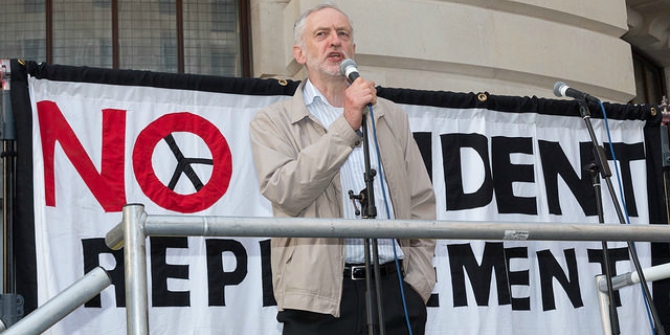 The recent row between Liam Fox and the Treasury over the cost of renewing the UK’s nuclear deterrent shows that there are no longer any more public spending ‘sacred cows’ that can be funded without question. And Nick Clegg’s recent unscripted answers critical of Trident suggest that there is a bloc of Liberal Democrat ministers in Cabinet who will back the Treasury line and the Tory realists who want to protect conventional forces. Chris Brown looks at the divisions within the coalition government over the renewal of the programme, and finds that its future is far from certain.
The recent row between Liam Fox and the Treasury over the cost of renewing the UK’s nuclear deterrent shows that there are no longer any more public spending ‘sacred cows’ that can be funded without question. And Nick Clegg’s recent unscripted answers critical of Trident suggest that there is a bloc of Liberal Democrat ministers in Cabinet who will back the Treasury line and the Tory realists who want to protect conventional forces. Chris Brown looks at the divisions within the coalition government over the renewal of the programme, and finds that its future is far from certain.
The story so far: in the election campaign Labour and the Tories pledged that Trident would be replaced by another submarine-launched nuclear deterrent, while the Liberal Democrats advocated a review to determine whether there was a cheaper way of maintaining the deterrent, assuming it was to be maintained at all. In the Coalition agreement, it was agreed that the Conservative position would be implemented, with the Lib-Dems reserving their position; Liam Fox, a supporter of a like-for-like Trident replacement, became Secretary of State for Defence. Now read on…
After 100 days of coalition government it looks possible that the issue of a Trident replacement is about to be re-opened. This is for two reasons: first, as Deputy Prime Minister Nick Clegg loses few opportunities to point out, in the context of a comprehensive spending review where all aspects of government expenditure are being placed under the microscope, that it makes very little sense to exclude the Trident replacement programme from this process. So much, so predictable given Liberal Democrat policy, but the second, more important, reason for thinking that this issue is still alive is the unexpected decision of the Chancellor to change the traditional method of funding the Trident replacement.
In the past the Treasury has picked up the capital cost of the deterrent (this time predicted to be around £20 billion over 15 years) out of general contingency funding, while the running cost of keeping the boats at sea came from the Defence budget. This made a certain kind of sense, since while the submarines were clearly part of the fleet, and crewed in the same way that the other Royal Navy ships were crewed, the decision to have a submarine deterrent in the first place was not taken by the Navy or the Defence establishment as such, but at the highest political level. The defence establishment might well have preferred to spend the money involved in building the submarine fleet in a different way, but were not given the option – and so it was deemed reasonable for the Treasury to pick up this part of the bill.
George Osborne appears to have unilaterally decided that this arrangement will not do, and the Defence budget must pick up the whole cost of the programme. If this stands – and Liam Fox is clearly furious at the Chancellor’s decision and is doing his best to have it overturned – it will make what is already a very difficult position for the Defence budget, absolutely impossible. It is already the case that the RAF’s Tornados will probably have to be moth-balled 10 years earlier that planned in order to buy afford the next tranche of Eurofighters, and quite likely one of the Navy’s new carriers will be fitted out only with helicopters, but even so the figures don’t add up at the moment, and with the Trident replacement costs added to the mixture the situation is really dire.
So what’s likely to happen? It seems to me that cancellation of the like-for-like replacement for Trident is a real possibility. With the exception of a few submariners, it is very difficult to find any senior serving officer who doesn’t privately regard replacing Trident as a ludicrous waste of money – and once they retire, the Generals are not shy in writing to the Times to express this view. What is intriguing is the possibility that the Chancellor shares this view; perhaps the newer generation of Tory leaders (the Notting Hill set of whom we rarely hear nowadays) are less committed to expensive status-symbols than the older generation represented by Liam Fox? David Cameron’s recent forays into foreign policy suggest that he is more comfortable with the obvious truth that Britain is no longer a great power than his Tory (or for that matter Labour) predecessors, and if this is finally to be officially recognised it undermines the case for replacing Trident.
Clearly there will have to be a Cabinet decision on the Chancellor’s ploy, and the Prime Minister’s role will be crucial. The boring decision would be to put Trident replacement on hold for the time being. As suggested in earlier posts, there is no reason to take the decision now, the life of the existing boats could probably be extended. But if David Cameron really wants to signal that all areas of public expenditure are up for grabs, cancelling the Trident replacement would get the message across in no uncertain terms.








I wonder how much adopting the French’s air-launched nuclear deterrent would cost. The range would not be as far, true, but with the new carriers in development, it’s not that much of a problem. Unless the UK is secretly worried that they might go into *nuclear* war against a power that they cannot get a carrier to?